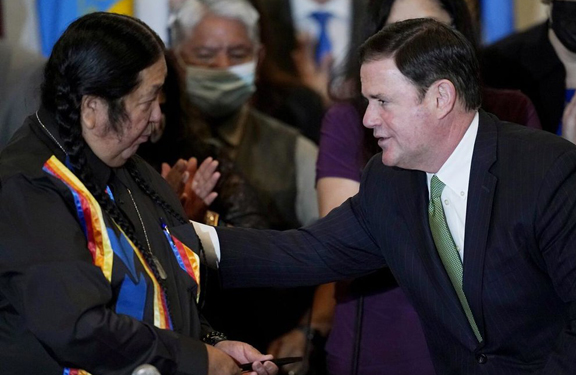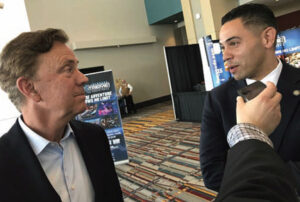
Damon R. Clarke (l.), chairman of Arizona’s Hualapai Tribe and Governor Doug Ducey shake hands on a new gaming compact
In April, representatives of more than a dozen tribal nations stood with Arizona Governor Doug Ducey as he signed legislation to bring sports betting to the state.
The deal, years in the making, was inextricably tied to tribal-state gaming compacts, and each constituent got a piece of the action. In exchange for opening the door to commercial sportsbooks, tribes saw their compacts extended for 20 years. The plan allows at least four new tribal casinos and could add thousands of slots and other games in years to come. Of course, along with pro sports teams and racetracks, the tribes will get a slice of the sports betting pie.
The negotiations, while sometimes contentious, ended on a positive note. At the signing ceremony, Gila River Governor Stephen Roe Lew said, “We argued before we agreed. We fought before we found our middle ground. But here we are today, celebrating the most unique unicorn in political life: A genuine win for us all.”
Ducey went one further, calling the agreement “a win-win-win—for the tribes, for the state and for the taxpayers.”
There may be no better definition of a good deal, in which each side asserts its rights, concedes without capitulating and reaches a solution that benefits all parties.
Cards on the Table
Such negotiations don’t always end well. Last year, gaming tribes in Oklahoma found themselves in a protracted battle with Governor Kevin Stitt over the terms of their own gaming agreements, originally signed in 2004 with then Governor Brad Henry.
According to the tribes, their 15-year compacts automatically renewed on January 1. According to Stitt, the compacts expired 24 hours earlier, and were in line to be ratcheted up to a “market rate” fee on Class III games.
Stitt’s position sparked an outcry. Oklahoma Secretary of Native American Affairs Lisa J. Billy resigned, saying the governor was “breaking faith with the tribes.” Attorney General Mike Hunter said Stitt’s position “undermined the credibility and honor of the state when engaging in these sensitive inter-sovereign relations.” Former Governor Brad Henry weighed in, telling Tulsa World, “I’m worried that the dispute may end up in court. That won’t be good at all for the state.”
When the state’s legal fees topped $1.5 million, House Minority Leader Emily Virgin told Stitt to drop it, calling the governor’s compact negotiations “a stimulus package for trial lawyers.” At the height of the pandemic, she said, “The governor is wasting money that could be spent on resources that help our citizens.”
Finally, last July, a federal court ruled for the tribes, but the fight has left a residue of distrust and tension that may not bode well for future negotiations.
Come Together
Arizona and Oklahoma could serve as object lessons in how tribes and states make deals—and in some cases, try to break them.

Seminole officials gather with Florida Governor Ron DeSantis (center) and Hard Rock Chairman Jim Allen (far right) to celebrate the signing of a new tribal-state compact
These lessons are especially timely as scores of compact terms draw to a close and governments rework them in line with new business realities. The first gaming compacts were written in the early 1990s, after the enactment of the Indian Gaming Regulatory Act (IGRA). Back then, the internet wasn’t yet widespread and online betting was unheard of, unimaginable to all but a few future-casters and techno-geeks. As for sports betting, it was limited to Nevada and a handful of jurisdictions grandfathered in before Professional and Amateur Sports Protection Act. Add new competition to new technologies and new ways of betting, and confusion about compacts may be inevitable.
To add to the complexity, though the compacts share certain provisions, each one is as distinct as a thumbprint. Some have low to no revenue-sharing, as in Minnesota, Washington, Wyoming, Oregon and Louisiana. Some are written in perpetuity, as for tribes in Colorado, Connecticut, Idaho, Kansas, Minnesota, Nebraska, Nevada, New York, Oregon, Washington and Wisconsin.
“And a lot depends on where you are in your relationship with the state and the administration,” says Sheila Morago, executive director of the Oklahoma Indian Gaming Association. “If it’s not a good relationship, you’re probably not going to have a good time of it.”
In the Beginning
According to IGRA, a compact is an “intergovernmental agreement… that establishes the terms and conditions for the operation and regulation of the tribe’s Class III gaming activities.”
As described by the Bureau of Indian Affairs (BIA), IGRA was enacted “to provide a statutory basis for the operation of gaming by Indian tribes as a means of promoting tribal economic development, self-sufficiency and strong tribal governments.”
But according to Harry Jackson, gaming attorney with the nationwide law firm Fox Rothschild, IGRA began as an almost patriarchal agency.
“As as a result of the (1987) Cabazon decision, Congress quickly passed IGRA. It was advertised as, ‘Well, we don’t want the Native Americans to be taken advantage of; we need to be there as a watchdog or guardian, because they can’t take care of themselves.’” Tribes were seen almost as wards of the U.S. government (“condescending,” says Jackson) and the feds assumed the role of referee.
“If a state was dragging its feet on a compact or the two sides couldn’t reach an agreement, then the federal government could step in and say, ‘This is how it’s going to be.”
Later, in the wake of Seminole Tribe v. Florida (1996), the federal government took a more hands-off approach.
“They left it to the states to negotiate in good faith according to language of IGRA,” says Jackson. “So we’re seeing a lot of back and forth—‘Let’s reopen the compact, let’s change some things.’ In Oklahoma, they asked the tribes to contribute more in gambling revenue, which caused a lot of friction between tribal leaders and the state.
“Any time you go to reopen a compact or change it, everybody’s got white knuckles on the dashboard. They’re asking, ‘What else are they going to change? What will they take away in order to give us something new?’
“It’s a very thorny issue,” says Jackson, “and a very personal one, because of the history. A lot of these tribes are on their original land, but they remember what happened when they were removed from that land—or put there.”
Big Business
While tribal gaming enterprises may be big businesses, they are also family businesses, says Morago.
“Gaming is the lifeblood of tribal economies. A lot of tribes have branched out into other industries, which is great, but some just don’t have the option, and this is how their governments run. The infrastructure, the scholarships, the health care—all of it resulted from money from tribal gaming.”
In many cases, gaming tribes make major investments for brief original compact terms, sometimes less than a decade, “and they need to have some certainty” about their standing, about exclusivity and renewals, “especially if they’re going to banks for loans.”
The tribes also wield great power, and bring it to bear at the bargaining table. In 2018, the Seminole Tribe stopped its $350 million annual payments to Florida in a dispute over banked card games at parimutuels. After a two-year stalemate, the tribe and Governor Ron DeSantis hammered out a new 30-year deal, signed in April and pending approval by the state and the Interior Department.
In exchange for dropping its claims against the parimutuels, the tribe can introduce craps and roulette at its seven casinos and offer sports betting. According to the website CardsChat.com, in a “technical win” for parimutuels, those venues can also offer sports bets, but must give a cut of revenues to the tribe. For the state, it guarantees payments of $1 billion over the next five years, escalating from there.
It’s not a done deal yet. Confusion still reigns about mobile sports betting as it conforms to IGRA, and the Florida proposal is already under challenge.
“I don’t think it even passes the sniff test,” says John Sowinski, president of No Casinos and promoter of Amendment 3, which requires voter approval for any gaming expansion in Florida. “The file server being on tribal land does not make the gambling on tribal land. If you accept that premise, then the tribe could operate casinos all over the state as long as the random number generators in the slot machines were on tribal lands.”
Tribes in other states, like California, have resisted mobile sports betting until the question is settled.
Originally, says Jackson, “It was easy to define Class III gaming as the casino experience with table games, but even then, there were disputes as to what falls under Class III. That’s the argument we’re seeing now as tribes and states go to the negotiating table to talk sports betting. How are the states defining it? Where does Class III gaming stop under IGRA? It’s not a settled thing yet.
“It needs to be addressed, to put sports betting in a clean box. Right now, it doesn’t quite fit.”
One thing seems sure: tribes have no desire to reopen and amend IGRA itself, says Morago.
“Mobile, iGaming, esports—all these technologies are coming online, but it’s a matter of going in and making little surgical tweaks to compacts, because no one want to renegotiate everything. There’s an overriding federal law we have to abide by. It has to be updated, but people are wary of opening up IGRA. It could turn into a Pandora’s box.
“IGRA isn’t a perfect piece of legislation by any means,” she says, “but tribes are learning to work within the boundaries that gave them primacy. Some legislators may want to go through and take some of that primacy away and add new restrictions.”
Let’s Make A Deal

Mashantucket Pequot Chairman Rodney Butler (r.) with Connecticut Governor Ned Lamont worked together on a new tribal-state gaming compact to bring iGaming and mobile sportsbooks to the state
In March, Connecticut Governor Ned Lamont and the Mashantucket Pequot and Mohegan tribes revised their gaming compacts for the next 10 years to include sports betting and online gaming, pending approval by the state and BIA.
The complex deal adds retail and mobile sportsbooks and iGaming, with a tax on GGR of 18 percent for five years that rises to 20 percent for the last five years. Sports betting will be taxed at 13.75 percent.
Discussing the deal later on a podcast with Victor Rocha of Pechanga.net, Chairman Rodney Butler of the Mashantucket Pequot Nation said he would “love to push back” on some parts of the compact deal, but was motivated to get the deal done.
“We could be at the table for five more years, but at end of day, we have to look at what’s best for our nation. We have 5,000 employees we’re concerned about, and whatever impacts them positively impacts us positively. We could have continued to haggle over the details get a few more points on the tax rate and revenue-share on sports betting, but all in all, it’s a good deal, and we’re pleased enough to come out and support it with the Mohegans.”
That’s the mark of a good deal, Butler said, “when nobody walks away completely happy.”






